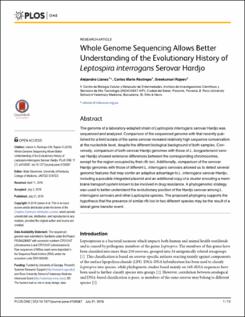| dc.contributor.author | Llanes, Alejandro | |
| dc.contributor.author | Restrepo, Carlos Mario | |
| dc.contributor.author | Rajeev, Sreekumari | |
| dc.date.accessioned | 2020-06-16T02:49:14Z | |
| dc.date.available | 2020-06-16T02:49:14Z | |
| dc.date.issued | 2016-07-21 | |
| dc.identifier.other | DOI:10.1371/journal.pone.0159387 | |
| dc.identifier.uri | http://repositorio-indicasat.org.pa/handle/123456789/72 | |
| dc.description | The genome of a laboratory-adapted strain of Leptospira interrogans serovar Hardjo was sequenced and analyzed. Comparison of the sequenced genome with that recently published for a field isolate of the same serovar revealed relatively high sequence conservation at the nucleotide level, despite the different biological background of both samples. Conversely, comparison of both serovar Hardjo genomes with those of L. borgpetersenii serovar Hardjo showed extensive differences between the corresponding chromosomes, except for the region occupied by their rfb loci. Additionally, comparison of the serovar Hardjo genomes with those of different L. interrogans serovars allowed us to detect several genomic features that may confer an adaptive advantage to L. interrogans serovar Hardjo, including a possible integrated plasmid and an additional copy of a cluster encoding a membrane transport system known to be involved in drug resistance. A phylogenomic strategy was used to better understand the evolutionary position of the Hardjo serovar among L. interrogans serovars and other Leptospira species. The proposed phylogeny supports the hypothesis that the presence of similar rfb loci in two different species may be the result of a lateral gene transfer event. | en_US |
| dc.description.abstract | The genome of a laboratory-adapted strain of Leptospira interrogans serovar Hardjo was sequenced and analyzed. Comparison of the sequenced genome with that recently published for a field isolate of the same serovar revealed relatively high sequence conservation at the nucleotide level, despite the different biological background of both samples. Conversely, comparison of both serovar Hardjo genomes with those of L. borgpetersenii serovar Hardjo showed extensive differences between the corresponding chromosomes, except for the region occupied by their rfb loci. Additionally, comparison of the serovar Hardjo genomes with those of different L. interrogans serovars allowed us to detect several genomic features that may confer an adaptive advantage to L. interrogans serovar Hardjo, including a possible integrated plasmid and an additional copy of a cluster encoding a membrane transport system known to be involved in drug resistance. A phylogenomic strategy was used to better understand the evolutionary position of the Hardjo serovar among L. interrogans serovars and other Leptospira species. The proposed phylogeny supports the hypothesis that the presence of similar rfb loci in two different species may be the result of a lateral gene transfer event. | en_US |
| dc.format | application/pdf | |
| dc.language.iso | eng | en_US |
| dc.rights | Info:eu-repo/semantics/openAccess | |
| dc.rights | https://creativecommons.org/licenses/by/4.0/ | |
| dc.title | Whole Genome Sequencing Allows Better Understanding of the Evolutionary Historyof Leptospira interrogans Serovar Hardjo | en_US |
| dc.type | info:eu-repo/semantics/article | en_US |
| dc.type | Info:eu-repo/semantics/publishedversion | |

